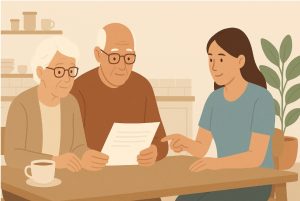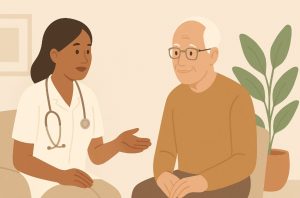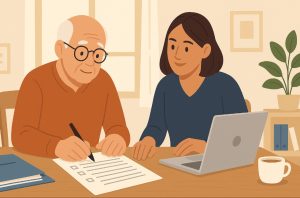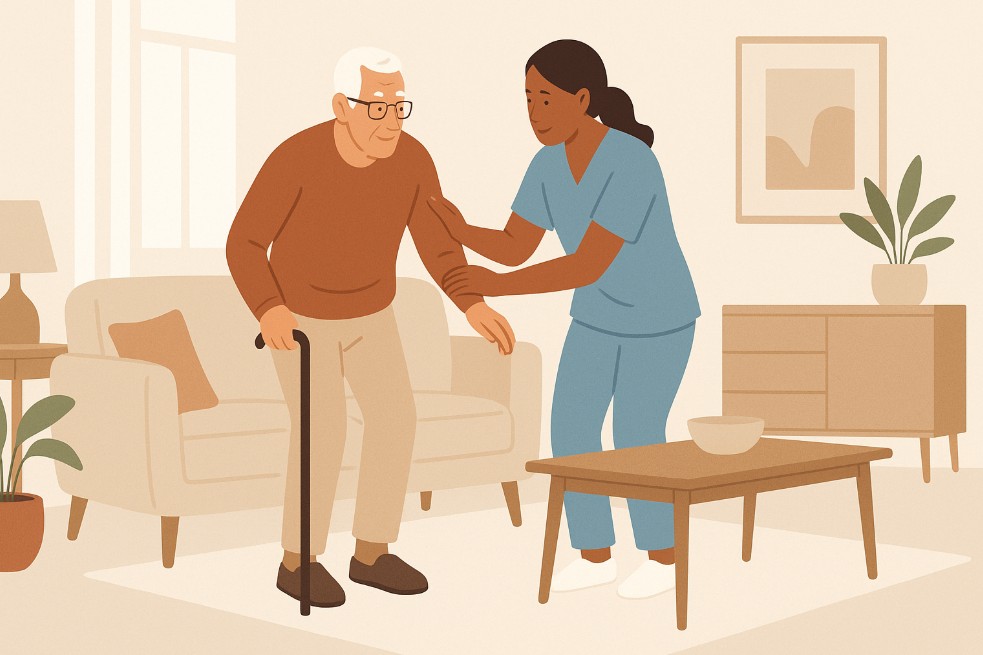What happens when daily life becomes difficult due to a long-term illness or disability? Could you or someone you know be missing out on vital financial support?
In the UK, thousands of pensioners are eligible for Attendance Allowance but either don’t know about it or assume they won’t qualify because they haven’t been diagnosed with a specific condition. The truth is, Attendance Allowance isn’t about the diagnosis itself it’s about how your condition affects your ability to manage daily personal care or stay safe.
This guide explains who is eligible, what conditions are commonly accepted, what the benefit covers, and how to apply successfully.
What Is Attendance Allowance and Who Can Claim It?

Attendance Allowance is a non-means-tested benefit aimed at individuals over State Pension age who need help or supervision due to a physical or mental condition.
It is administered by the Department for Work and Pensions (DWP) and is designed to help people remain independent, particularly in their own homes.
The benefit is paid at two weekly rates, depending on the level of help required whether during the day, night, or both.
You can receive Attendance Allowance if:
- You are of State Pension age or older.
- You have a physical disability, mental health condition, sensory impairment, or chronic illness.
- Your condition results in a need for frequent care or supervision with personal tasks.
- You have had these needs for at least six months (unless you’re terminally ill).
- You meet residency and immigration requirements.
What Care or Supervision Needs Are Considered?
Eligibility is based on how much help you need, rather than the specific medical diagnosis. Attendance Allowance can apply whether someone physically helps you or not what matters is whether help would be reasonable and necessary for you to live safely and comfortably.
The DWP typically considers the following types of assistance:
- Personal care tasks like bathing, dressing, eating, or using the toilet.
- Taking medication or managing treatment properly.
- Supervision to prevent accidents, confusion, or dangerous behaviour.
- Help during the night, such as getting out of bed, going to the bathroom, or managing incontinence.
If these needs exist, even if no one currently helps you, you may still qualify.
What Medical Conditions Typically Qualify?
There is no official list of medical conditions that automatically qualify a person for Attendance Allowance. The benefit is awarded based on how the condition affects daily living, not the diagnosis itself. That said, there are several conditions that frequently lead to successful claims, as they often cause ongoing care needs.
Physical Conditions Often Considered:
| Condition | How It Affects Care Needs |
| Arthritis | Limits mobility, causes pain and stiffness |
| Stroke | Can cause paralysis, speech and memory issues |
| Multiple Sclerosis | Affects mobility, balance, fatigue, coordination |
| Parkinson’s Disease | Causes tremors, stiffness, falls, cognitive decline |
| Chronic Pain Syndromes | Interferes with movement and physical tasks |
| Heart Disease | Causes fatigue, breathlessness, weakness |
Sensory and Neurological Conditions:
| Condition | How It Affects Care Needs |
| Blindness or Visual Impairment | Limits ability to navigate or prepare meals |
| Deafness or Hearing Loss | Impairs communication and awareness of danger |
| Epilepsy | Risk of seizures requiring supervision |
| Motor Neurone Disease | Affects all muscle control |
| Peripheral Vascular Disease | Affects walking, standing, circulation |
Mental and Cognitive Conditions:
| Condition | How It Affects Care Needs |
| Dementia or Alzheimer’s | Memory loss, confusion, need for constant oversight |
| Learning Disabilities | Difficulty understanding or managing tasks |
| Psychosis | May cause behaviour that needs monitoring |
| Severe Anxiety or Depression | Interferes with self-care or safety awareness |
| Behavioural Disorders | May result in self-harm or aggression requiring supervision |
Many other chronic conditions, such as diabetes, asthma, respiratory diseases, and cystic fibrosis, may also qualify if they result in ongoing care or supervision needs.
Is a Diagnosis Required for Attendance Allowance?

A common misconception is that a formal diagnosis is needed. This is not the case. You do not need a confirmed diagnosis to make a claim, though medical evidence helps support your application. What matters most is how the condition limits your ability to live independently or carry out personal care routines.
If your case is unclear, the DWP may request a medical assessment, during which a healthcare professional will evaluate how your condition affects you. You will be notified in advance if this is required.
Are There Special Rules for Terminal Illness?
Yes. If you have been diagnosed with a terminal illness and are not expected to live beyond 12 months, you can apply under the special rules for end of life care. In this case:
- The six-month waiting rule does not apply.
- You can apply using the DS1500 form, which your doctor can complete.
- The claim is automatically awarded at the higher rate.
- No face-to-face assessment is required.
This ensures that individuals who are terminally ill receive support as quickly and smoothly as possible.
Are There Residency or Immigration Requirements?

To be eligible for Attendance Allowance, you must meet residency and immigration conditions. You must:
- Be in Great Britain when you make your claim (exceptions apply for armed forces families)
- Have lived in Great Britain for at least 2 out of the last 3 years
- Be habitually resident in the UK, Ireland, Isle of Man or Channel Islands
- Not be subject to immigration control (unless sponsored)
UK nationals who live in the EU, EEA or Switzerland may still be eligible, but rules vary. You should check government guidance or consult with a benefits adviser.
Can You Claim If You Live in a Care Home or Hospital?
Your place of residence can affect eligibility:
| Living Situation | Eligibility |
| Care home (self-funded) | You can claim Attendance Allowance |
| Care home (local authority-funded) | You cannot claim |
| Hospital (NHS-funded) | You can apply, but payment begins after discharge |
| Hospice (terminal illness) | You can receive Attendance Allowance |
How Much Can You Receive and How Is It Paid?
Attendance Allowance is paid weekly and not affected by income or savings. The rate depends on the level of care you need:
| Level of Help Needed | Weekly Rate (2024/25) |
| Help during day or night | £73.90 |
| Help during day and night | £110.40 |
You can spend this money however you wish to cover carer expenses, home adaptations, or support services.
How Do You Apply for Attendance Allowance?

Applying for Attendance Allowance involves completing a detailed application form that helps the Department for Work and Pensions (DWP) understand the nature of your illness or disability and how it affects your daily life.
The process is straightforward, but success often depends on how thoroughly and accurately you describe your condition and your care or supervision needs.
You can apply by:
- Calling the Attendance Allowance helpline to request a paper form.
- Downloading the application form (AA1) from the official GOV.UK website.
The form will ask about:
- Your personal details
- Your medical conditions or disabilities
- The help you need with personal care or supervision, during the day, night, or both
- Any special equipment or mobility aids you use
- Information from your GP, specialist, or carer, if available
It’s important to take your time completing the form and to be specific and honest. For instance, rather than simply saying you need help with dressing, explain why does it cause pain, is your balance affected, or does it take much longer than it used to?
You may also attach additional supporting documents, such as:
- Doctor’s letters or hospital discharge summaries
- Statements from carers or family members
- Social care assessments
Once completed, you should send the form to the address provided. You will receive a response by post, and in some cases, you may be asked to attend a medical assessment to clarify your needs.
Does Receiving Other Benefits Affect Your Claim?

In some cases, receiving certain disability benefits may affect whether you can claim Attendance Allowance. This is particularly relevant if you’re already receiving a benefit that covers similar care needs.
You cannot receive Attendance Allowance at the same time as:
- Personal Independence Payment (PIP) – if you are under State Pension age when the claim is made.
- Disability Living Allowance (DLA) – if you’re receiving the care component.
- Adult Disability Payment (ADP) – the Scottish equivalent of PIP.
- Scottish Adult Disability Living Allowance (SADLA) – another regional alternative.
If you are currently receiving one of these benefits and reach State Pension age, you will typically continue on the same benefit unless your entitlement ends. At that point, you may be eligible to apply for Attendance Allowance.
It’s also important to know that Attendance Allowance is not means-tested, which means your income or savings will not affect your eligibility or payment. Additionally, it is tax-free, and receiving it will not reduce most other benefits. In fact, in some cases, receiving Attendance Allowance may increase the amount of Pension Credit, Housing Benefit, or Council Tax Reduction you can get.
If you are unsure how Attendance Allowance interacts with your existing benefits, it’s a good idea to contact Citizens Advice or a welfare rights adviser for personalised guidance.
Conclusion
While there is no fixed list of qualifying medical conditions, Attendance Allowance is available to individuals who can demonstrate that their disability, illness, or condition results in a need for personal care or supervision.
Whether you suffer from arthritis, dementia, a sensory impairment, or another chronic illness, you may be entitled to this valuable support.
By understanding the eligibility criteria and clearly documenting how your condition affects your daily life, you improve your chances of a successful claim. If in doubt, seek help from Citizens Advice, Age UK, or other welfare support services to guide you through the process.
Frequently Asked Questions
Can I apply for Attendance Allowance without a diagnosis?
Yes. If you’ve needed help with personal care or supervision for six months, you can apply, even if you’re still waiting for tests or appointments.
Can mental health conditions qualify for Attendance Allowance?
Yes. Conditions like severe anxiety, depression, and dementia are frequently accepted, especially if they result in care or safety needs.
What if I don’t currently have a carer?
You don’t need to have someone providing help; what matters is that you need help. Claims can be made even if you live alone.
How long does it take to process an Attendance Allowance claim?
Typically, decisions take around 6 to 8 weeks unless you are applying under the special rules for terminal illness.
Do I need to attend a medical assessment?
Only if the DWP needs further clarification on how your condition affects you. You will be notified in advance.
Can I apply if I live abroad?
Possibly, if you are a UK national living in the EU, EEA or Switzerland and meet specific eligibility rules.
Is Attendance Allowance taxable?
No. It is tax-free, non-means-tested, and does not affect most other benefits.




